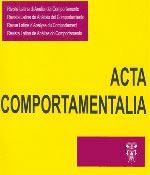La dimensión moral de la conducta desde una óptica interconductual
Main Article Content
Abstract
Morality has been studied by psychology through three different theories: psychoanalysis, cognitivism and behaviorism. Each one has focused on separate issues that are only features of the problem. Thus, psychoanalysis investigates disciplinal)' techniques that parents use to teach children moral behavior, concluding that the best are those which arouse internal controlling responses as guilt or self criticism Cognitive theory studies the way children develop moral judgments, and the main interest is related to the criteria they use to judge the behavior of other people. Behavior theory focuses mainly on the consequences of moral or in moral responses, so the different parameters of stimuli and their effect to behavior become the purpose of investigations. The three approaches have limitations related, to one hand, to the dualistic basis of their theories, and on the other, to the lacking of principles and concepts that lead to a delimitation of the psychological dimension of a complex behavioral process where social conventions are basic. For these reasons this paper presents an alternative approach to the moral dimension of behavior. This is based on the inter behavioral theory, especially on an inter behavioral applied system for the analysis and change of individual human behavior: cotangential analysis. This system includes two dimensions: the microcontingential system and the macrocontingential system.
Article Details
Citas en Dimensions Service

<a rel="license" href="http://creativecommons.org/licenses/by-nc-sa/4.0/"><img alt="Licencia de Creative Commons" style="border-width:0" src="https://i.creativecommons.org/l/by-nc-sa/4.0/88x31.png" /></a><br />Este obra está bajo una <a rel="license" href="http://creativecommons.org/licenses/by-nc-sa/4.0/">licencia de Creative Commons Reconocimiento-NoComercial-CompartirIgual 4.0 Internacional</a>.
